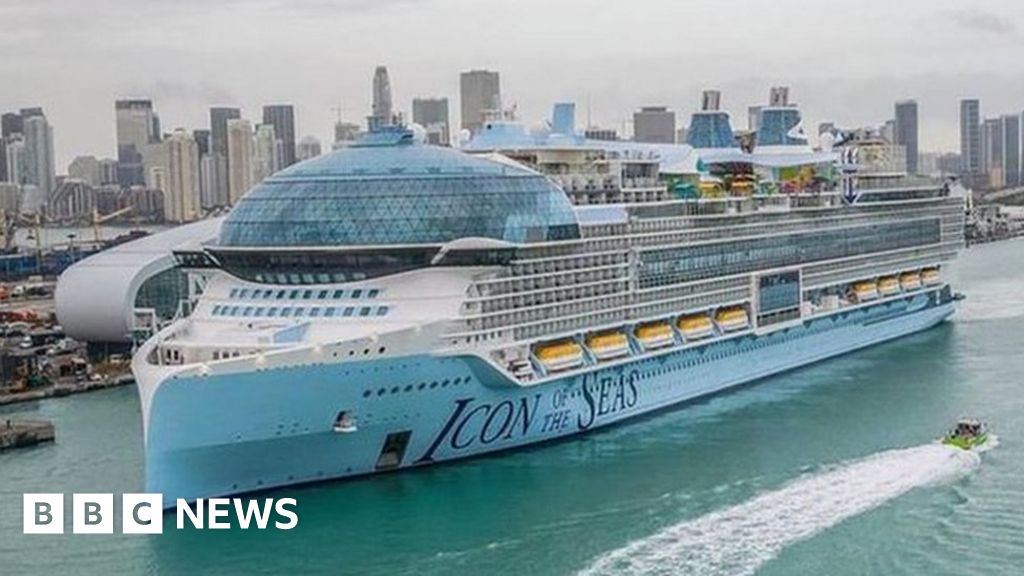Icon of the Seas: World’s largest cruise ship sets sail from Miami

Watch: A look at Icon of the Seas as it leaves the Port of Miami
The world’s largest cruise ship has set sail from Miami, Florida, on its maiden voyage, but there are concerns about the vessel’s methane emissions.
The 365m-long (1,197 ft) Icon of the Seas has 20 decks and can house a maximum of 7,600 passengers. It is owned by Royal Caribbean Group.
The vessel is going on a seven-day island-hopping voyage in the Caribbean.
Environmentalists warn the liquefied natural gas (LNG)-powered ship will leak harmful methane into the air.
Built at a shipyard in Turku, Finland, the Bahamas-registered ship has seven swimming pools and six water slides.
It cost $2bn (£1.6bn) to build and also has more than 40 restaurants, bars and lounges.
Image source, Getty Images
The cruise ship boasts seven swimming pools, many bars and restaurants and a funfair on the top deck
Although LNG burns more cleanly than traditional marine fuels such as fuel oil, there is a risk that some gas escapes, causing methane to leak into the atmosphere.
Methane is a much more potent greenhouse gas than carbon dioxide.
“It’s a step in the wrong direction,” Bryan Comer, director of the Marine Programme at the International Council on Clean Transportation (ICCT), was quoted as saying by Reuters news agency.
“We would estimate that using LNG as a marine fuel emits over 120% more life-cycle greenhouse gas emissions than marine gas oil,” he said.
Earlier this week, the ICCT released a report arguing that methane emissions from LNG-fuelled ships were higher than current regulations assumed.
Image source, Getty Images
A sculpture of a swimmer hangs above an internal courtyard – known as “Central Park” on the ship
A powerful greenhouse gas, methane in the atmosphere traps 80 times more heat than carbon dioxide over 20 years. Cutting these emissions is seen as crucial to slowing down global warming.
Royal Caribbean says the Icon of the Seas is 24% more energy efficient than required by the International Maritime Organization for modern ships. The company plans to introduce a net-zero ship by 2035.
The cruise industry is one of the fastest growing sectors of tourism, with young people in particular interested in cruise holidays, according to the trade body Cruise Lines International Association.
It said that the cruise industry contributed $75bn (£59bn) to the global economy in 2021.
Image source, Getty Images
The onboard water park is dubbed “Thrill Island”
On Thursday, Argentina’s World Cup winning captain Lionel Messi, who currently plays for Inter Miami, took part in the ship’s naming ceremony.
He was seen placing a football on a specially built stand to trigger the traditional “good luck” breaking of a champagne bottle against the vessel’s bow.
Quick facts about the Icon of the Seas
- The Icon of the Seas is the largest cruise ship in the world, weighing 250,800 tonnes with a length of nearly 365 meters (1,198 ft). That’s about five times larger than the Titanic
- The ship itself cost Royal Caribbean International a hefty price of €1.65bn ($1.79bn; £1.41bn) to build and acquire
- Tickets range from $1,723 to $2,639 per person, according to Royal Caribbean’s website. A high-season cruise around Christmas will set you back $5,124 per person
- Its maiden voyage will stop in Saint Kitts and Nevis and Charlotte Amalie in the US Virgin Islands.


